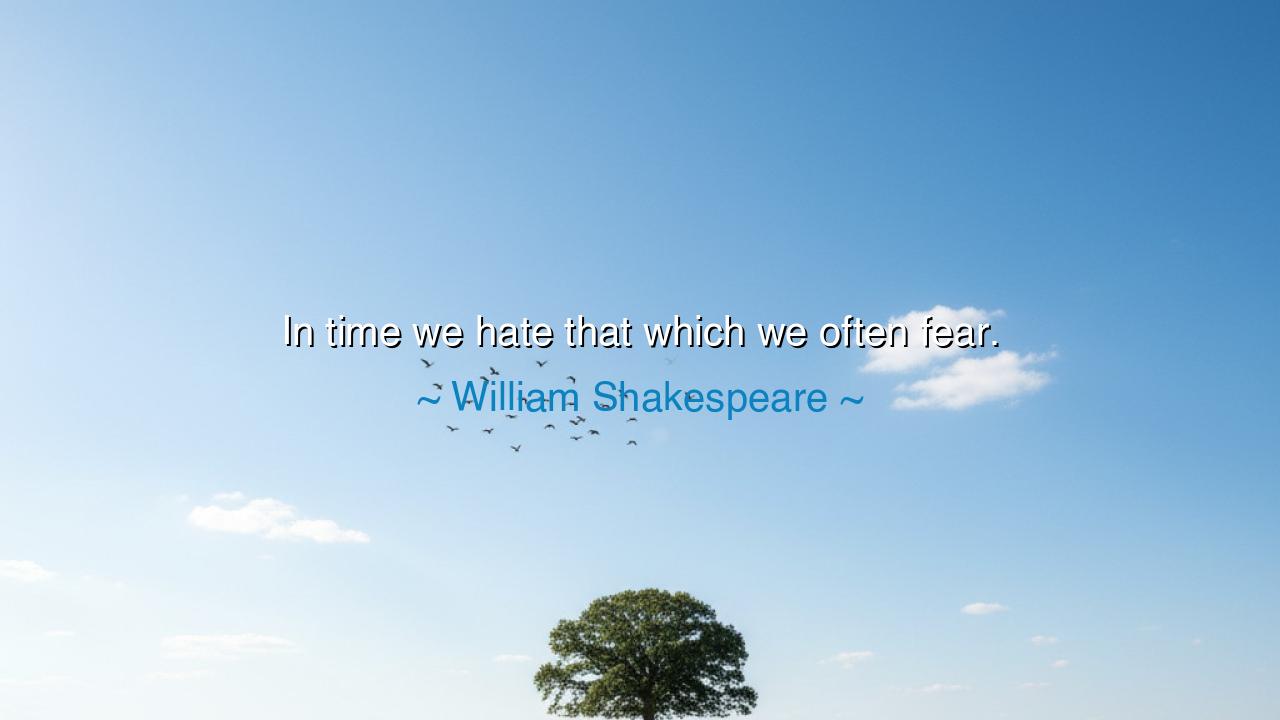
In time we hate that which we often fear.






Hear the timeless words of William Shakespeare: “In time we hate that which we often fear.” With these few syllables, the Bard uncovers a truth that lies deep within the human soul—that fear, left to fester, grows into hatred. What begins as trembling avoidance can harden into loathing, until what we once dreaded we now despise. This is no idle observation but a law of the heart, repeated across history and echoed in the struggles of nations, families, and the inner battles of the self.
The ancients knew that fear is the seed from which many darker passions grow. Fear unsettles the spirit, narrows the vision, and blinds the soul to reason. When it lingers, it seeks release, and too often that release is found in turning fear outward, in striking against the very thing that frightens us. Thus, over time, the frightened heart declares war upon its own terror, and hatred is born. Shakespeare, master of human nature, saw this pattern woven into the tragedies of kings and the follies of lovers.
Consider the story of the Romans and the Carthaginians. At first, Rome feared the rising power of Carthage, whose ships ruled the seas. Fear drove Rome to conflict, and as years passed, that fear hardened into bitter hatred. By the time of the Third Punic War, the Romans would accept nothing less than Carthage’s utter destruction. They burned the city to the ground and cursed its soil, so no seed would grow again. What began as fear of a rival ended in hatred so consuming it demanded annihilation. Shakespeare’s words live in this tale, showing how fear, when not tempered, grows into hatred that knows no bounds.
And is this not also true in the smaller struggles of daily life? A child who fears failure may grow to despise the very subjects or tasks that once daunted him. A man who fears rejection may come to hate the ones he longed to impress. Nations that fear outsiders often turn that fear into hatred, persecuting strangers who sought only refuge. Thus, from the battlefield to the hearth, from politics to the heart, fear and hatred dance together as shadows of the same fire.
Yet Shakespeare’s wisdom also warns us: if we can master fear, we need not taste the poison of hatred. Fear is natural; it arises in all who live. But when met with courage, with knowledge, and with understanding, it can be transformed. The Romans might have chosen alliance with Carthage, learning from its strength rather than destroying it. The fearful student can, with patience, grow in mastery rather than despair. The fearful heart can, with trust, learn love instead of hate.
The lesson is clear: do not let fear linger unchallenged. Meet it with honesty, with humility, with courage. Ask yourself: Why do I fear this thing? For often, hatred grows not from what is truly monstrous, but from what is misunderstood. Replace ignorance with knowledge, suspicion with trust, distance with familiarity. In doing so, you uproot hatred before it can grow.
So let Shakespeare’s words echo like a warning bell across the ages: “In time we hate that which we often fear.” Take them not only as an observation, but as a call to action. Do not allow your fears to calcify into hatred. Instead, confront them, study them, overcome them. For the one who masters fear masters also the poison of hatred, and in its place finds freedom, wisdom, and peace. Thus may you walk not as a prisoner of shadows, but as one who has turned fear into a path toward light.






AAdministratorAdministrator
Welcome, honored guests. Please leave a comment, we will respond soon